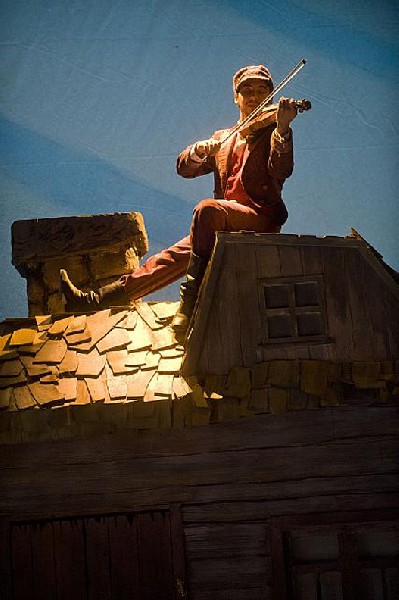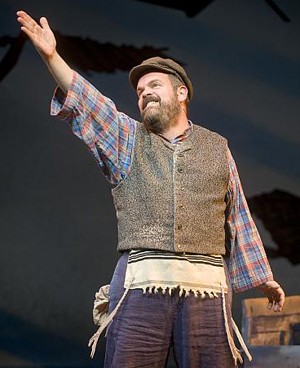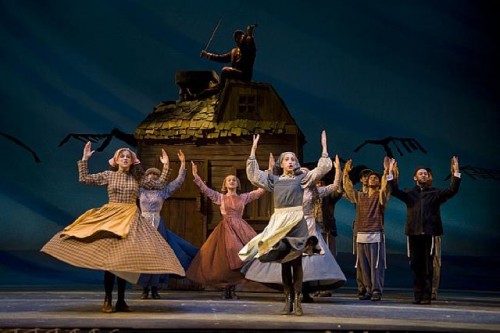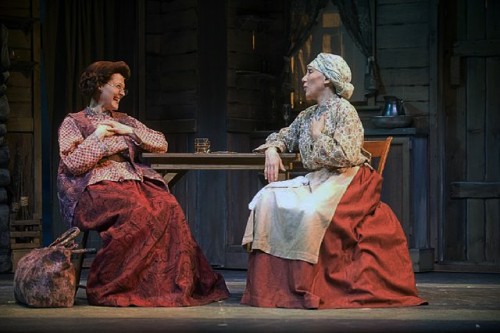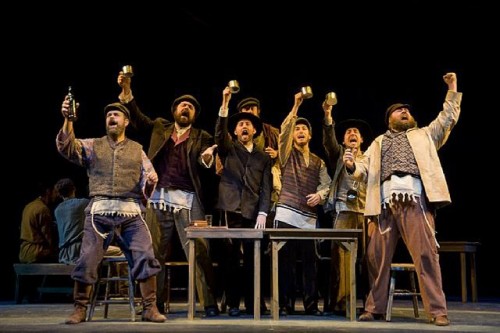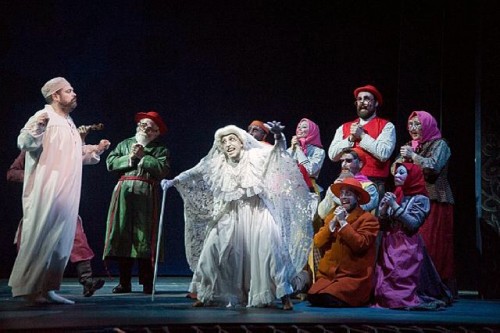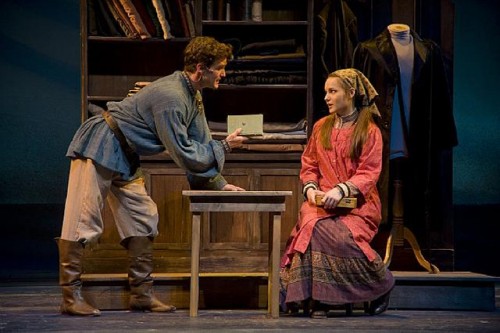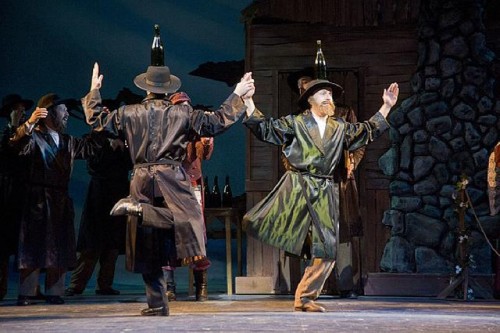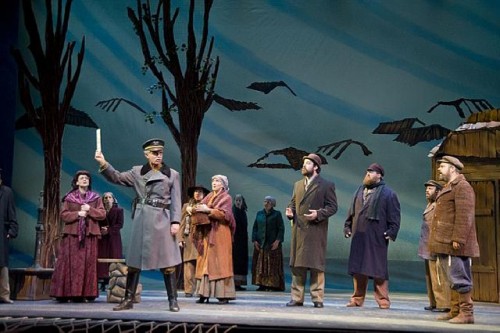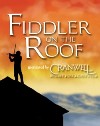Fiddler Falls Off the Roof at Barrington Stage
Brad Oscar Stumbles as Tevye
By: Charles Giuliano - Jun 22, 2012
The mandate of Barrington Stage Company in Pittsfield is to launch its Main Stage season with an iconic musical. Through July 14 it is the beloved Fiddler on the Roof with music by Jerry Bock, lyrics by Sheldon Harnick, and book by Joseph Stein, set in Tsarist Russia in 1905.
It is based on Tevye and his Daughters (or Tevye the Milkman and Other Tales) by Sholem Aleichem. The story centers on Tevye (Brad Oscar), the father of five daughters. As the opening number states it’s all about “Tradition” in the Jewish community of Anatevka a small Russian village.
As the man of the house, however poor, he alone must decide on the husbands of five daughters who come without dowries. Yente (Rachel Coloff) who charges a fee for matchmaking informs Tevye’s wife Golde (Joanna Glushak) that Lazar Wolf (Jason Simon), the wealthy, portly, butcher, a widower older than Tevye, wants to wed Tzeitel (Rebecca Kuznick), the eldest daughter. He will be a good provider with a business, house, and servant willing to waive a dowry for the beautiful young woman.
It would be a lot easier for Tevye "If I Were a Rich Man."
With many lach heims and mazaltovs washed down with endless rounds of schnapps the men boisterously agree on the match. It seems like a win win with financial security for his daughter. But Tzeitel has other plans to wed the equally poor tailor Motel (Colin Israel).
She pleads with her father not to condemn her to a miserable life through an arranged marriage. Here’s the thing. Tevye breaks with Tradition by allowing his daughter to marry for love. There is the matter of selling the idea to his wife in a truly hilarious dream sequence.
Letting the oldest daughter have her way opens the door for the other four daughters undermining his authority, tradition. It underscores a paradigm for the entire village about to be evicted through a pogrom by the army of the Czar.
The original Broadway production of the show, which opened in 1964, had the first musical theatre run to surpass 3,000 performances. Fiddler held the record for the longest-running Broadway musical for almost 10 years until Grease surpassed its run. It remains Broadway's fifteenth longest-running show in history.
There is much to enjoy in this splendidly staged and exuberant production directed and choreographed by Gary John La Rosa. In our first glimpse of the effective scenic design by Jack Mehler, we, literally, see the Fiddler on the Roof (Andrew Mayer). He would cavort on stage during key scenes bowing his instrument. The sets evoke the early 20th century, rustic, cubist depictions of Russian Jewish life in the beloved paintings of Marc Chagall.
Based on the whimsical Yiddish tales of Sholem Aleichem there is a predisposition of audiences to want to buy into a nostalgia driven fairy tale of village life under the Czars on the cusp of the Russian Revolution of 1917, its horrors later under Stalin, and the holocaust of World War II.
During the disapora of Russian and Eastern European Jewry it was the Yiddish of Sholem Aleichem that was the common language of uprooted peoples. Eventually Hebrew became the language of the newly formed, Post WWII state of Israel. In the early 20th century, particularly in the Lower East Side in New York, there was a great tradition of Yiddish theatre. Fiddler was a Broadway evocation of that immigrant culture. Boris Thomashefsky, was the first star of Yiddish theater in America. He is the focus of a work by his descendant the composer/ conductor Michael Tilson Thomas.
The early part of act one largely focuses on Tevye. He is the primary character and narrator. Indeed Tevye is the heart and soul of Fiddler. The character is the essence of wisdom, tradition, irony, humor, vacillation, whimsy and that uniquely poetic Yiddish response to repression, poverty and tragedy. It is the equivalent of the blues in African American culture.
None of these essential characteristics were evident in the stiff, uncompelling, awkward delivery of Oscar. I found myself simply not trusting or believing his Tevye. He seemed to be delivering lines that he didn’t feel. As to comedic whimsy and irony? Oi vey.
During the development of the first act culminating in the joyous, rambunctious, wedding scene we were caught up and swept away by a truly wonderful ensemble. Oscar was more effective when absorbed into raucous scenes with as many as 25 actors on stage.
That's when the musical evolved, magnificently, into the celebratory Fiddler that we came to see. One could not help but be drawn in by great music, terrific choreography, and a superb nine piece orchestra under the precise musical direction of Darren Cohen.
Overall, the singing, including Oscar, was top notch. For me, the most stunning voice was that of Perchik (Alexander Levin) who is in love with Hodel (Stephanie Lynne Mason) the second daughter. His outsider, teacher/ revolutionary character provided some push back and edge to the looming impact of impending tragedy. He is a singular voice of reason and resistance.
The emotional arc of the musical is reached in the exuberance of the wedding that ends act one. There are threating hints such as the Constable (Michael Scott) who as a friend of Tevye warns of approching disaster. There are also the three Russian lads in the drinking scene between Tevye and The Butcher. They morph into soldiers and thugs. But one of them falls in love with the third daughter (Dawn Rother). After eloping without her father's blessing subsequently she is dead to Teve and Golde.
It shakes Teve to his foundation that their daughter has married outside their faith and defied tradition.
The first act comes to a crashing end when it is disrupted by thugs. There is a mood shift from the fun of act one to a dark decline and diaspora by the end of act two. Perhaps it is this gravitas and historic authenticity that make Fiddler such a relevant and enduring, bitter/ sweet musical with a message.
There is an irony that although the villagers were evicted in 1905, like many Russian immigrants who flocked to the Lower East Side, Chicago, Montreal, and Toronto their families survived the holocaust.
For many in the audience Fiddler, on Broadway and here in the Berkshires, is a poignant and compelling reminder of family history.
Fiddler on the Roof
Directed and Choreographed by Gary John La Rosa.
Musical Direction by Darren Cohen.
Scenic Diesign, Jack Mahler; Costume Design, Michael Bottari and Ronald Chase; Lighting Design, Jeff Davis; Sound Design, Ed Chapman.
Cast: Brad Oscar as Tevye, Joanna Glushak as Golde, Tzeitel (Rebecca Kuznick),Hodel (Stephanie Lynne Mason),Chava (Dawn Rother), Yente (Rachel Coloff0, Motel (Colin Israel), Lazar Wolf (Jason Simon) and ensemble.
Running Time: Just under 3 hours including one intermission.
June 13-July 14, 2012
Barrington Stage Company
Main Stage
Union Street, Pittsfield, MA.
Box Office: 413-236-8888.

